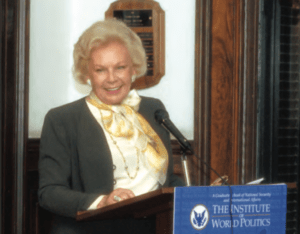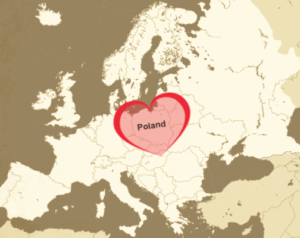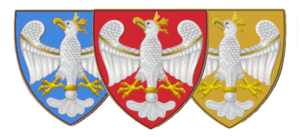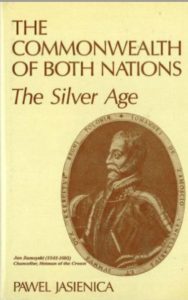
A new chair has been established at The Institute of World Politics named after a Polish general who served as one of the heroes of America’s War of Independence: Thaddeus Kościuszko. The Kościuszko Chair of Polish Studies is the Institute’s fourth academic chair, and on November 7th, the Marlatt Mansion hosted an event celebrating its inauguration. The guest of honor was Lady Blanka Rosenstiel, Founder and President of the American Institute of Polish Culture (AIPC), whose passion for American-Polish relations and the two countries’ traditions of liberty was the chief catalyst behind the Chair’s creation. Over a hundred guests came to show their support for the Institute and the new chair.
In 1998, the Kościuszko Chair was established by AIPC at another university but, due to inactivity, the Chair was returned into AIPC’s care until a suitable replacement could be found. Happily, following a nationwide competition among fourteen major academic institutions, including Harvard, Columbia, and Princeton, IWP was chosen as being best suited to carry out the Chair’s mission.
The Kościuszko Chair will enable its holder to study, teach, and research about history, culture, politics and civilization of the lands of the Polish-Lithuanian Commonwealth (which today include Poland, Belarus, Ukraine, Moldova, and parts of Russia), Polish-American relations, Poland’s geo-strategic neighborhood, and east-central Europe’s relations with Western Europe and Russia.
Much of the history of this part of the world is unknown, including the fact that the Polish- Lithuanian Commonwealth was for several centuries the largest power of imperial scope in Europe, yet without being an empire. This is as close a historical analogue to the United States as exists in history because the Commonwealth elected its own kings. The study of Poland’s past, with its five century-old noble democracy, elective monarchy, habeas corpus, property rights, religious liberty, and political freedom yields vital lessons for the political health of free societies, particularly the United States.
The Kościuszko Chair will enable its holder to study, teach, and research about history, culture, politics and civilization of the lands of the Polish-Lithuanian Commonwealth (which today include Poland, Belarus, Ukraine, Moldova, and parts of Russia), Polish-American relations, Poland’s geo-strategic neighborhood, and east-central Europe’s relations with Western Europe and Russia.
Marek Jan Chodakiewicz has been appointed the first holder of the Kościuszko Chair. He teaches a number of courses, including “East-Central Europe Since 1918,” “Russian Politics and Foreign Policy,” “Genocide and Genocide Prevention,” and “Geography and Strategy.” Dr. Chodakiewicz earned his M.A. (1990), M.Phil. (1992), and Ph.D. (2002) in history from Columbia University, where he was a Richard Hofstadter Fellow (1989-1994). He is arguably one of the most productive scholars in the world in the field of east-central European history. In addition to many popular and scholarly articles, Dr. Chodakiewicz has authored or coauthored over a dozen books, including The Massacre in Jedwabne, July 10, 1941: Before, During, After (2005); Between Nazis and Soviets: A Case Study of Occupation Policies in Poland, 1939-1947 (2004); and After the Holocaust: Polish-Jewish Conflict in the Wake of World War Two (2003).
The Kościuszko Chair was named after a truly remarkable man. A member of the Polish nobility, Kościuszko was recruited in Paris by Silas Deane and Benjamin Franklin to fight for the fledgling American struggle for independence. By the end of 1776, the young Pole was Chief Engineer of the entire Continental Army. His talent with defensive fortifications repeatedly played a crucial role in the American war effort, most notably at the Battle of Saratoga. Kościuszko’s fortifications of West Point are still visible today.
During his time in America, Kościuszko also met and became close friends with Thomas Jefferson, who once referred to him as “as pure a son of liberty as I have ever known.” After the war, Kościuszko returned to Poland where his military talents and leadership were called upon once again. A man of unwavering principle, Thaddeus Kościuszko died an exile in Switzerland in 1817. He is remembered in America as an adopted son and in Poland as one of its greatest heroes.
The Kościuszko Chair was awarded as a $1,000,000 challenge grant by AIPC. As part of the agreement, the Institute pledged to match AIPC’s original gift within three years of the signing. At the inaugu- ration ceremony, Lady Rosenstiel announced that she intended to contribute an additional $25,000 on top of her initial major investment in this chair. Adam and Ava Bak also announced a $100,000 gift toward the match.
Reflecting upon the inauguration of the Chair, the Institute’s Founder and President, Dr. John Lenczowski, remarked, “The establishment of the Kościuszko Chair at IWP offers our school a rare opportunity to sponsor a scholar whose teaching and research can shed important light on the lessons taught by the history of a country, which, like America, has had a long-standing mission dedicated to the cause of liberty and the defense of our Western civilization.”






